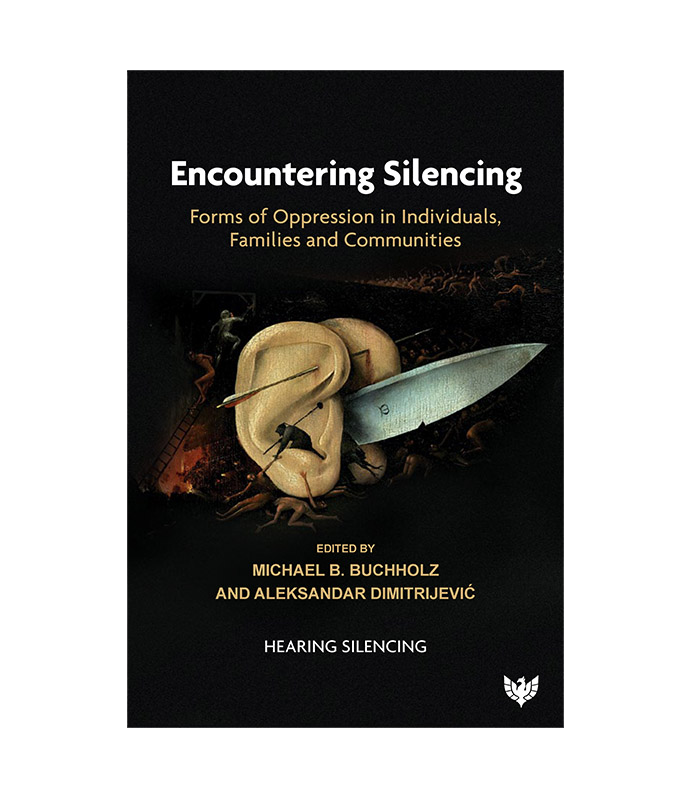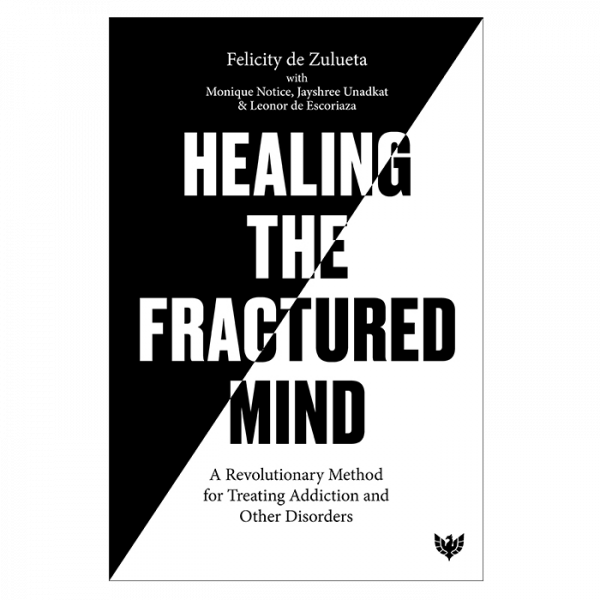Encountering Silencing is an invitation to closely observe the very practices and processes of silencing used by perpetrators of abuse and totalitarian institutions alike. A carefully selected group of contributors reveal the dark side of communication that silences victims, witnesses, and perpetrators: women, religious heretics, gifted children, victims of racism, psychoanalytic dissidents, and psychiatric patients; individuals and groups, total strangers and one’s family members, as well as one own self. All of these forms of silencing are analysed with the help of literature, historiography, interviewing, archival research, and psychoanalytic and family therapy.
This book helps us to face the seemingly inevitable conclusion that silencing is everywhere in our individual and social lives, and that it is the silencing of trauma that leads to mental disorders more than trauma itself. The hope is that by opening up these topics in a considered, containing, and thoughtful way, the underlying mechanisms of trauma-related disorders will be better understood and help victims to overcome them.
Encountering Silencing is the first in a series of three books on this vital but overlooked subject.






 Aleksandar Dimitrijević, PhD, is a clinical psychologist and psychoanalyst in private practice in Berlin. He worked as a university lecturer for more than twenty years. He has given lectures, seminars, university courses, and conference presentations throughout Europe and in the US. He is the author of many conceptual and empirical papers about attachment theory and research, psychoanalytic education, and psychoanalysis and the arts, some of which have been translated into German, Hungarian, Italian, Slovenian, Spanish, and Turkish. He has also edited or co-edited twelve books or special journal issues, the most recent of which are Ferenczi’s Influence on Contemporary Psychoanalytic Traditions (with Gabriele Cassullo and Jay Frankel), and Silence and Silencing in Psychoanalysis and From the Abyss of Loneliness to the Bliss of Solitude (both with Michael B. Buchholz).
Aleksandar Dimitrijević, PhD, is a clinical psychologist and psychoanalyst in private practice in Berlin. He worked as a university lecturer for more than twenty years. He has given lectures, seminars, university courses, and conference presentations throughout Europe and in the US. He is the author of many conceptual and empirical papers about attachment theory and research, psychoanalytic education, and psychoanalysis and the arts, some of which have been translated into German, Hungarian, Italian, Slovenian, Spanish, and Turkish. He has also edited or co-edited twelve books or special journal issues, the most recent of which are Ferenczi’s Influence on Contemporary Psychoanalytic Traditions (with Gabriele Cassullo and Jay Frankel), and Silence and Silencing in Psychoanalysis and From the Abyss of Loneliness to the Bliss of Solitude (both with Michael B. Buchholz).
Ofra Bloch, psychoanalyst and filmmaker –
‘Following their brilliant book From the Abyss of Loneliness: to the Bliss of Solitude, in which they teased out the silence in which loneliness tends to germinate, the writers and co-editors Buchholz and Dimitrijevic turn their magnifying glass and sound amplifiers into the eye of the storm and encounter silencing. Gathering an impressive list of contributors in their new co-edited book, Encountering Silencing, they examine meticulously the intricacies of active silencing of victims, perpetrators, and witnesses – the triad of participants in traumatic events – spreading from self-silencing to the denial and disavowal in socio-political groups and institutions of the truth about traumatic experiences. They do not shy away from facing the long tradition of silencing creative voices in the history of psychoanalysis as well. In this book, with the help of their contributors, Buchholz and Dimitrijevic recognize that silencing is a human form of communication, inspired by the malignant consequence of power. They emphasize that it is the act of silencing and not the trauma per se that leads to emotional suffering and mental pain. This book does more than paint the roadmap of the processes and mechanisms involved in silencing and its consequences so we can recognize them as clinicians. It is also an invitation for all of us to sharpen our skills and expertise and nurture the courage that is needed in the important battle against acts of silencing. At the end of this book, I was left with the sensation that there is already another book in the making by this duo, a book about power that I’m already eager to read.’
Peter Fonagy, OBE, FMedSci, FBA, PhD, Professor of Contemporary Psychoanalysis and Developmental Science, UCL; Chief Executive, Anna Freud National Centre for Children and Families, London –
‘There are few innovative concepts in psychoanalysis these days. The active, mostly unconscious intrapersonal or social imposition of silence, preventing giving voice to experience, charts a fresh and essential course through clinical and societal experience. This fascinating book explores in a multifaceted way perhaps the most fundamental of psychoanalytic ideas – why is the expression of experience in words so close to the core of what is uniquely human, and what happens when forces combine to prevent full manifestation of experience? The editors bring together some of the most sophisticated writers in our discipline to re-explore core psychoanalytic ideas through this innovative lens. The result is an outstanding, highly original, and immensely valuable collection of perspectives on what may be one of the most important ideas in contemporary psychoanalysis. A major book that is likely to become a classic contribution.’
Tilmann Habermas, Professor of Psychoanalysis, Goethe-Universität Frankfurt Am Main, Germany –
‘The editors and authors of this fabulous book complement the psychoanalytic focus on the intrapsychic dialectics of experiences included and excluded from consciousness with a focus on collective processes of experiences included and excluded from public discourse. They discuss both small (psychoanalytic associations) and large “groups” (subcultures, entire societies). The book is a crucial contribution to connecting psychological with cultural and social analyses. This volume will inspire all readers interested in understanding the psychology of collective emotions and memories.’
Evelyn Niel-Dolzer, Buchrezension, August 2024 (translated from the original German) –
‘In short, I am convinced that the originality, range, accuracy and seriousness that characterize all the contributions in this book are of great benefit to systemic psychotherapists in their topicality and expertise. I personally read it as an indispensable contribution to the further development of “our” theoretical and practical self-image. […] This book is written for you, you young people, those who are young at heart and passionate thinkers! You will be thrilled.’
Lutz Wittmann, PSYCHE, November 2025, (translated from the original German) –
‘In the first two chapters of the book, Michael Buchholz and Aleksandar Dimitrijević, partly with the assistance of literary scholar Hans-Christoph Ramm, explore “silencing” processes from the perspectives of victims, perpetrators, and witnesses in specific past or present political constellations. On the other hand, with a stylistic assurance worthy of their sources, the authors narrate and comment on stories of silencing from literature ranging from Ovid and British classics to contemporary Nigerian works. In doing so, they offer the reader an almost synesthetic experience, which evokes associations for me with the wisdom of Forrest Gump’s mother (“Life is like a box of chocolates. You never know what you’re gonna get.”) and with the Pavlovian conditioning paradigm. Just as a child opens a candy wrapper in joyful anticipation of the sweetness, their mouth already watering at the sound of the paper crunching – I felt similarly whenever a paragraph sparked my anticipation of the detailed analysis of another literary work, full of curiosity about what awaits me this time.’